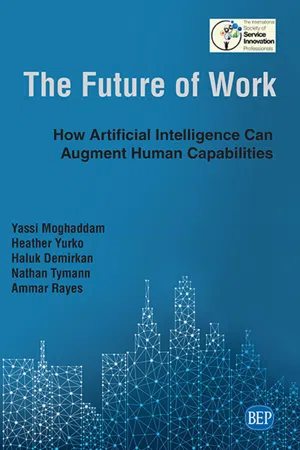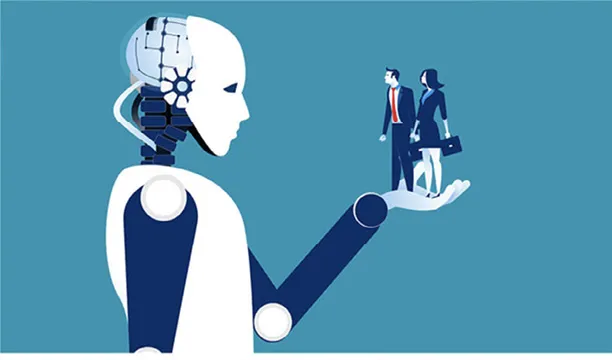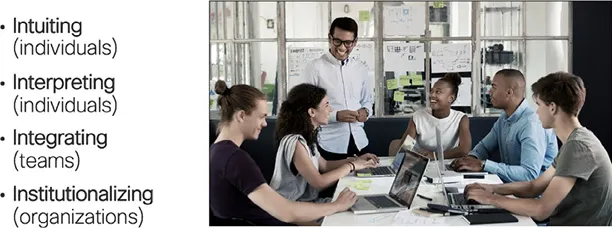![]()
CHAPTER 1
Introduction: Preparing for the Jobs of Tomorrow Today
Yassi Moghaddam
Advances in artificial intelligence (AI) fueled by machine learning are disrupting the way we live and work. AI will have wide-ranging impact on institutions, employment, jobs, wages, and income distribution, as machines emulate or exceed human capabilities. This phenomenon will create tremendous opportunities for economic progress, societal advancement, and individual prosperity and growth. Realizing these growing opportunities for a thriving future, however, will depend on significant collaboration today between different stakeholders from all sectors of society including industry, academia, government, and entrepreneurs.
The International Society of Service Innovation Professionals (ISSIP, see http://issip.org) is a nonprofit professional association established in 2012 to bring diverse stakeholders to study the impact of digitization on business, individuals, and society to help institutions and the individual navigate the complexities and exciting opportunities of value cocreation in our global digital economy. In ISSIP, communities of practice involving practitioners, students, faculty, policy makers, and others interested in advancing innovation in business and society come together to study and improve service ecosystems. Work, as a rapidly changing service ecosystem, fueled by disruptive technologies including AI and data analytics, is of particular interest to the ISSIP community. That is why since 2017 we have held a number of Discovery Summits, and workshops on this topic to help our members better prepare today for the opportunities and challenges of future of work.
The chapters of this book are written by attendees of the Future of Work Discovery Summits held in 2017 and 2018, both held at San Jose State University Lucas College and Graduate School of Business. In 2017, we explored how work environments are changing and in 2018 we explored how jobs are changing.
Most of the chapters in this book, chapters 2 to 5, are written by industry leaders who are either involved in AI and future of work research or are involved in the implementation of change in their enterprise that prepares the workforce today to be ready for the challenges and opportunities of tomorrow’s workplace. Chapters 6 to 9 were written by thought leaders from academia with perspectives on how individual lifelong learning and policy implications.
Chapter 2 by Tymann provides a perspective on the importance of individuals to lifelong learning and the roles of institutions to support lifelong learning of their workforce. Chapter 3 by Rayes outlines a map for what machine learning skills will continue to be in demand in decades to come. Chapter 4 by Srivastava provides a glimpse as to how AI is being leveraged to reskill the workforce. Chapter 5 by Spohrer offers a perspective on the importance of entrepreneurship in the future of work. Chapter 6 by Griffith proposes four dimensions that we all need to manage to be success in work and life. Chapter 7 by Agrawal lays out policy challenges and opportunities. And finally, Chapter 8 by Kwan provides recent views of U.S. government regarding the future of jobs and AI.
Looking at common themes across the chapters, it becomes apparent that tasks that are most prone to automation involve activities in highly structured and predictable environments. Generally, tasks will be automated, not jobs. It is important for all workers whether they are in tech or other industries to be digitally savvy and be AI literate. Some jobs, however, will be displaced. So, reskilling and lifelong learning is an imperative for every professional. Policy makers must deploy policies that encourage reskilling in high-risk sectors to support a digital economy in which institutions and individuals thrive.
![]()
PART I
Industry Perspective
![]()
CHAPTER 2
How Organizations Should Prepare for AI
Nathan Tymann
Abstract
In today’s workplace, it is critically important that people and organizations be adaptable. Increased market pressures, competition, and the rapid pace of change brought about by technology require a nimbleness that wasn’t needed in the past. Specifically, artificial intelligence and machine learning are likely to influence the future of work in ways that require new ways of thinking about job roles. This chapter begins by discussing how the future of work is being scripted due to the influence of artificial intelligence and machine learning. Next is an overview of research on the importance of continuous learning for individuals, teams, and organizations, followed by an examination of the type of leadership that learning organizations require to foster a culture of innovation, creativity, and stability. To close, a discussion of what these changing times mean for measuring job performance and for hiring the right people has been added.
One exciting part about working today is that technology gives us the opportunity to figure out what makes us uniquely human within the context of work. Technologies such as artificial intelligence and machine learning are making it possible to continue to offload certain critical, but transactional, job functions to free us up to perform job roles that humans do best. According to a recent article by the World Economic Forum (2018), this dynamic driven by technology is accelerating the evolution of the future of work into three types of jobs.
Figure 2.1 New types of jobs
Image credits: Center for generational kinetics
The first type includes jobs that some people are afraid about losing, but really shouldn’t be. These are predictable or highly repetitive jobs that don’t require intuition or judgment. These include jobs that computer programs perform better than humans. We’ve seen this dynamic since the Industrial Revolution and in manufacturing plants for a long time. These include many data entry jobs or other administrative jobs. Self-driving trucks are being experimented to replace human drivers on routes that travel through remotely populated areas. By enabling jobs like those to go to machines, humans are free to aspire to the next two categories of jobs.
The second category includes collaborating with the machine. Think of the evolution of these types of jobs as akin to what the advent of better tools meant to skilled craftsman over the centuries. A civil engineer used to rely on measurements and calculations done by hand to build a bridge, but now she will use computers and software to enable her to perform her task with more elegance and efficiency. Surgeons can now use computer-guided lasers to excise tumors with greater precision than most could accomplish with their hands.
The third category of jobs includes those that cannot be performed by machines. Jobs in the creative arts are in this category, along with other roles that require design, judgment, leadership, entrepreneurship, or innovation.
The benefits that technology provides are here to stay. So how do organizations adjust to maximize the creative and innovative capabilities that only humans offer while sustaining organizational excellence?
Organizational leaders need to foster a culture of continuous learning where new ideas and concepts are discussed and used to create innovation. Research shows that organizations cannot create innovative ideas by themselves, but they can create conditions by which teams can learn. Then teams can distribute new knowledge for the benefit of the entire organization (Stelmaszczyk 2016).
The Need to Embrace Continuous Learning
Team learning and organizational learning are different, but they are closely related. Team learning requires that teachers and learners actively collaborate to leverage the strengths of the teachers and that learning can be absorbed by the learners (Goolsarran, Hamo, Lane, Frawley, and Lu 2018). Within most teams, however, the teacher role and learner roles rotate because individuals on the team are experts in different bodies of knowledge. Team learning is a connector between learning at the individual level and learning at the organizational level. Research shows a linear relationship between individual learning, team learning, and organizational learning. According to Stelmaszczyk (2016), individual learning is manifested within teams. Team learning occurs when individuals communicate, test, and implement knowledge that they bring into the team. The collective knowledge of many teams represents organizational learning. While organizations benefit by the implementation of knowledge by teams, they cannot create knowledge on their own (Stelmaszczyk 2016).
Crossan, Lane, and White (1999) described organizational learning using the 4I model: intuiting, interpreting, integrating, and institutionalizing. The 4I framework posits that there are subconnections within an organization that span across individuals, teams, and organizations (Schilling, and Kluge 2009). Intuiting refers to the way in which individuals gain new ideas based on their own personal experiences. Interpreting happens when an individual explains what he knows to other people, either through words or actions. Integrating occurs at the team level when knowledge is shared more widely until it becomes common understanding within a team and then the team uses the knowledge to act. Finally, institutionalizing is when shared knowledge forms the organizational infrastructure through applied systems, processes, policies, and strategies. Therefore, organizational learning includes all four of these phases, inclusive of and dependent upon, individual learning and team learning (Schilling, and Kluge 2009).
Figure 2.2 4I’s for organizational learning
One example of an implementation of the relationship between team learning and organizational learning took place at a cancer treatment center in the United States (Valentine 2018). In this study, project leads, managers, and clinical operations staff members from across the cancer treatment center provided individual input through their functional teams to benefit the entire organization. A challenge in the study was the attempt to synchronize inputs from one team to another...


